Famous composers of the 21st century. Required documents for participant registration. Nominations and age restrictions
“Composers of the 21st century for children” Andrey Klassen Beketova Nina Aleksandrovna Municipal Autonomous educational institution culture preschool education children Children's music school Khabarovsk region, Komsomolsk-on-Amur All-Russian festival advanced pedagogical experience" Modern methods and teaching methods" Electronic periodical NAUKOGRAD
Internationality in music - nothing new in Germany?, in: Professional musical education and internationality, ed. Lorenz Luycken and Stefan Weiss. Reflecting Popular Culture in the Ghettoblast Minimalism of Jacob Ter Veldhuis, in: From Perotin to Steve Reich. Ideas of “minimal” in the history of music and modernity.
Music festivals in the Lower Rhine, in: North Rhine-Westphalia. Music criticism in modern Germany, in: Art in the modern musical swamp. Stefan Weiss, Professor of Historical Musicology at the Hochschule for Music, Theater and Media mass media Hanover, Institute of Musicology. When you look at the list of names associated with the St. Petersburg Conservatory, teachers, professors, alumni, rectors, patrons and benefactors, one instinctively feels a sense of awe.

Andrey Klassen was born on January 14, 1955. In the small mining town of Saran near Karaganda, in a family of exiled Germans. His father, Abram Abramovich, was a self-taught accordion player. Mother, Maria Genrikhovna, played the seven string guitar and had a great voice. His two sisters, Elena and Elisabeth, received musical education and currently live and teach at music schools in Germany.

This institution is associated with an incredible concentration of the greatest figures in world music history. The oldest music academy in Russia is celebrating this year. In the early years of its existence, it became a gathering place for the highest musical society.
Nissen-Saloman. The conservatory was not a normal educational institution. From the very beginning, the royal house took care of this. The opening took place under the patronage Grand Duchess Elena Pavlovna, wife of Mikhail Pavlovich. It was called the "Russian Musical Society", and based on its own music classes The first Conservatory of Russia was founded. Although the Conservatory was not a public institution of higher education, its graduates received diplomas with freelance artist status, as well as the opportunity to be honored as "honorary citizens."
Student years Graduate of pianists 1974 Temirtavskoye School of Music. In 1979 he graduated from the Novosibirsk State Glinka Conservatory in piano. In 1984 completed postgraduate studies at the piano department of the Institute of Arts in Vladivostok.


After the opening of the St. Petersburg Conservatory there were no permanent rooms for classes or its own concert hall. For more than 30 years, classes had to “travel” throughout the city. Finally, they found their home in the building of the former Bolshoi Theater on Theater Square. The rooms needed almost complete conversion. According to the plans of the architect Vladimir Nikolov, the foundations and walls of the Bolshoi Theater were preserved and integrated into the new building.
In a short article it is very difficult to explain how the traditions of the school and the school of translators of the St. Petersburg Conservatory developed. Of course, the most interesting thing to pay attention to are the outstanding representatives, as well as the most famous events, which represent individual stages musical history Conservatories. Anton Rubinstein was not only the main initiator of the creation of the Conservatory, but also became the first artistic director and the first professor of piano. The musician was immediately given the title of effective state adviser, and he showed through his work that he was rightfully considered high-ranking.
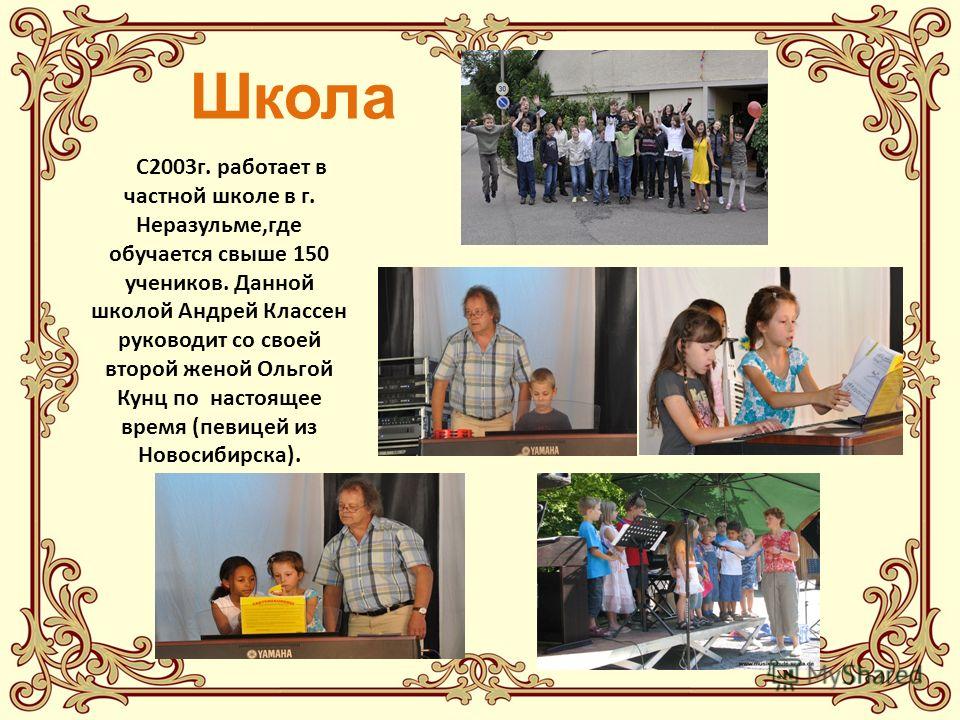




Among the most major projects Andrei Klassen can be credited with recording the orchestral score of the opera by the romantic composer Gustav Schmidt (Female Fidelity). It was possible to recreate the orchestral sound of the score and perform this opera at the Opera Festival in Weinsberg on the ruins of the castle where the events took place in 1140.
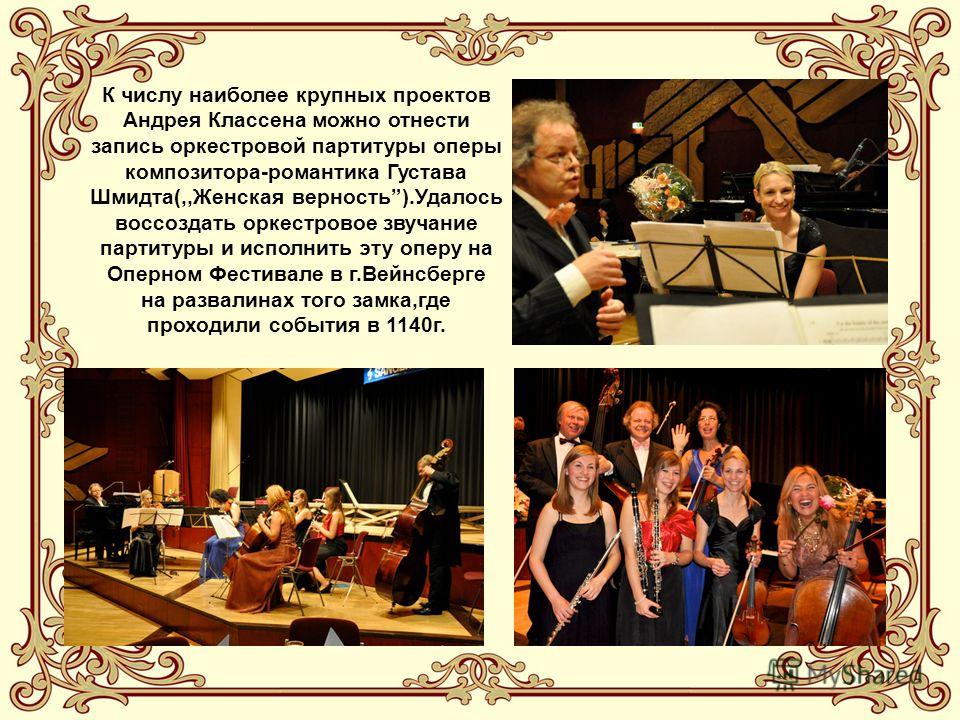
Rubinstein can only be compared to a few, because he did so much for the conservatory and vocational training musicians. The scalability of Rubinstein's character was recognized in his life and has not yet been extinguished. Kramskoy, during his enthusiastic creation of music, is to this day a symbol of this industrious force and acts as an incentive for the musicians playing in the small hall of the conservatory. Many years after the creation of the Conservatory, Rubinstein undertook an excellent project: a series of historical concerts of piano music.
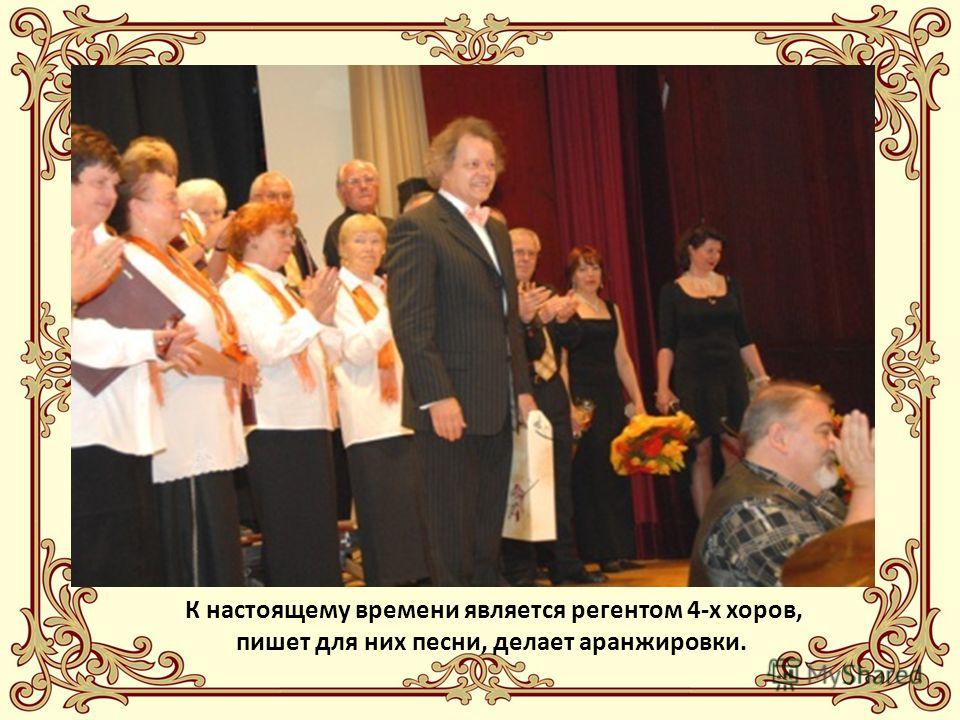

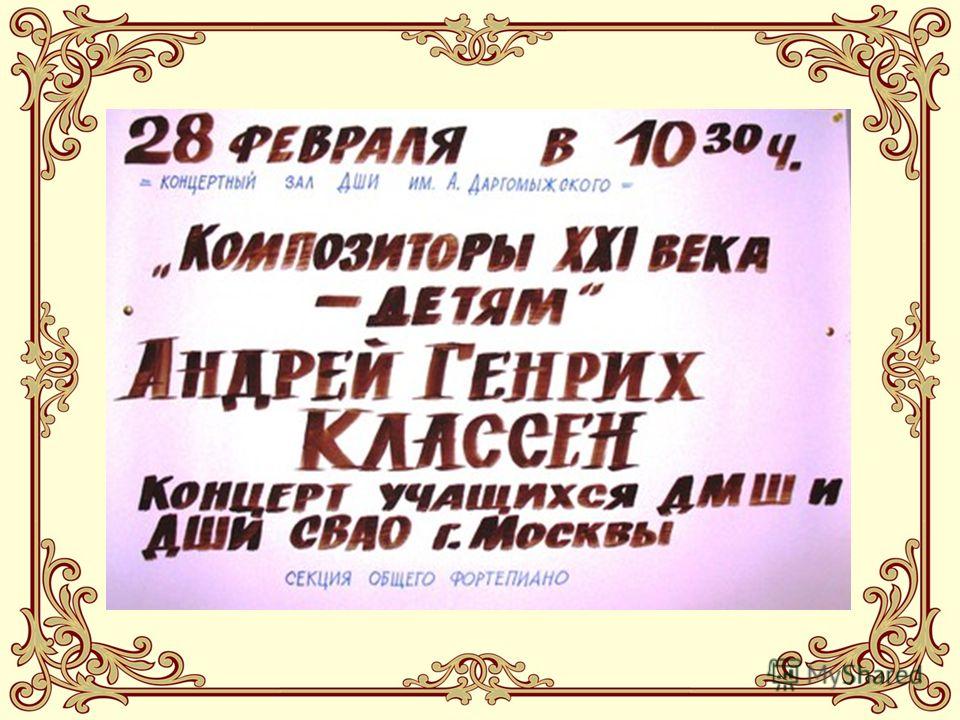
To his latest works refers to the song to the verses of Ella Gerasimenko If the heart lives for music children's choir with a string ensemble and piano, which he dedicated to the Children's School of Arts. Dargomyzhsky in Moscow. This piece will be performed for the first time in March 2013. within the walls of the school as part of the celebration of the 200th anniversary of Dargomyzhsky.
![]()
At these concerts he not only honored the music of his predecessors, but also paid great attention to his older contemporaries Chopin, Schumann and Liszt. A total of 877 works were performed by 57 composers, stylistically spanning the period from the beginning of the century to the second half. Saremba, an outstanding scholar in the field of theory and practice of music. A talented cello virtuoso, an outstanding conductor, outstanding composer and a great teacher, sacrificed a lot of energy and energy to the conservatory, whose cellist he was from the first year of its foundation.
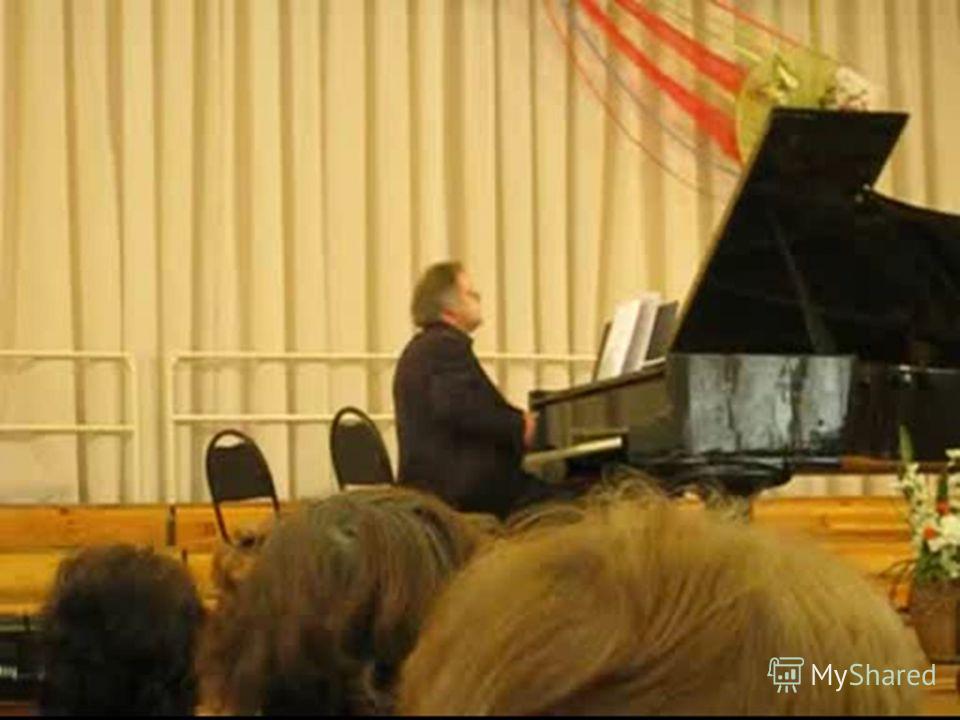
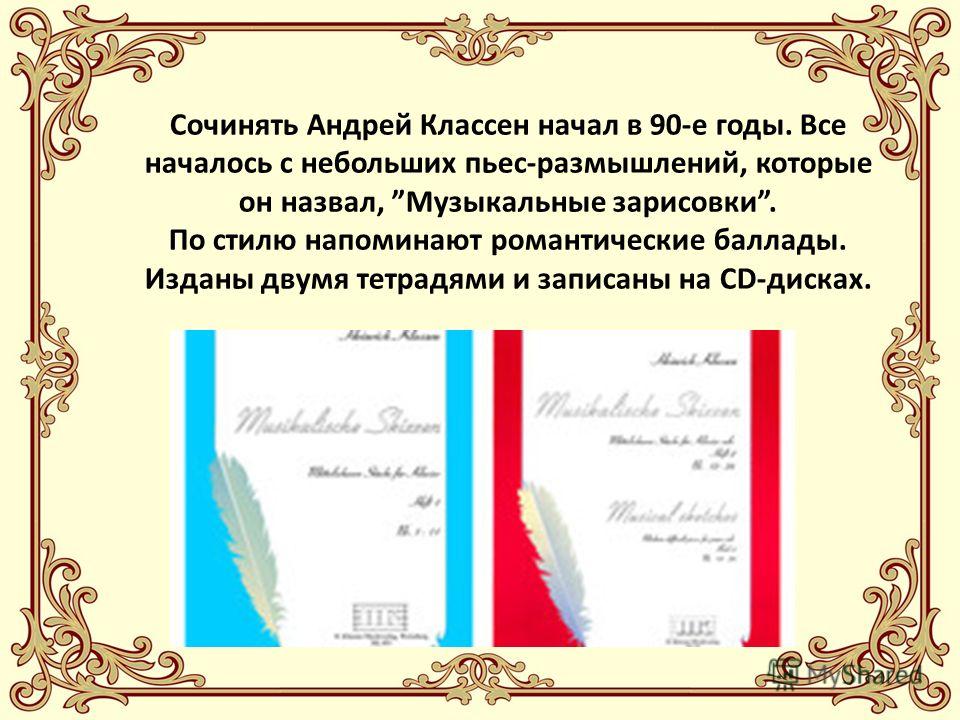
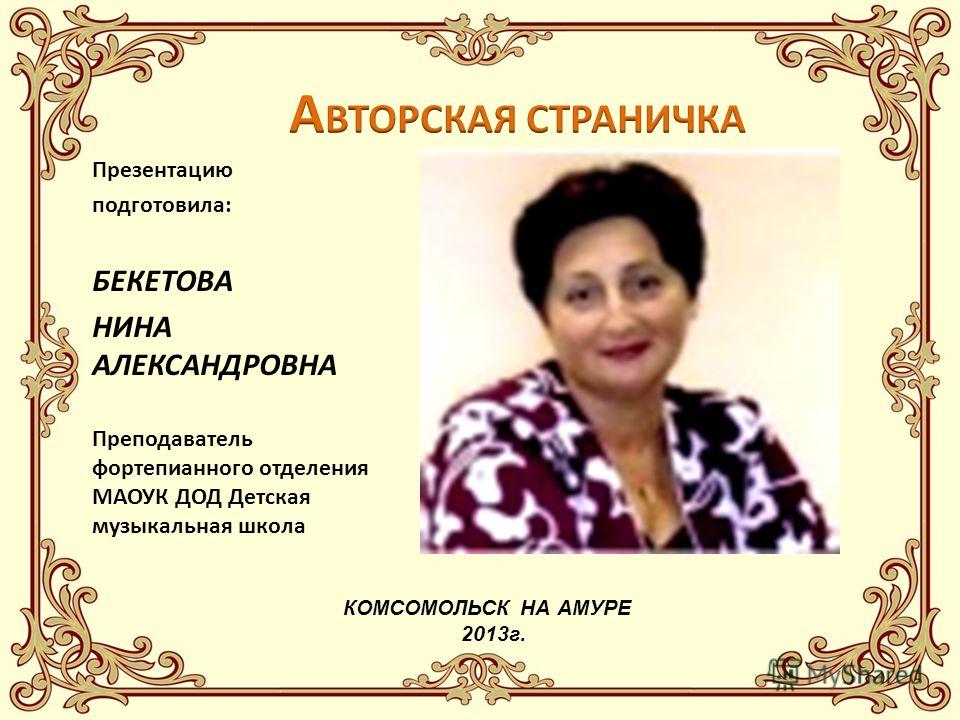
Resources used Private correspondence with the composer on Andrey Klassen's website; Klassen-mussikveland.de, htt://vkontakte.ru Klassen-mussikveland.de, htt://vkontakte.ru, 2012; Andrey Klassen “Musical Sketches” I notebook, II notebook, 1996; Andrey Klassen “Plays for children 2 and 4 hands”, 1998
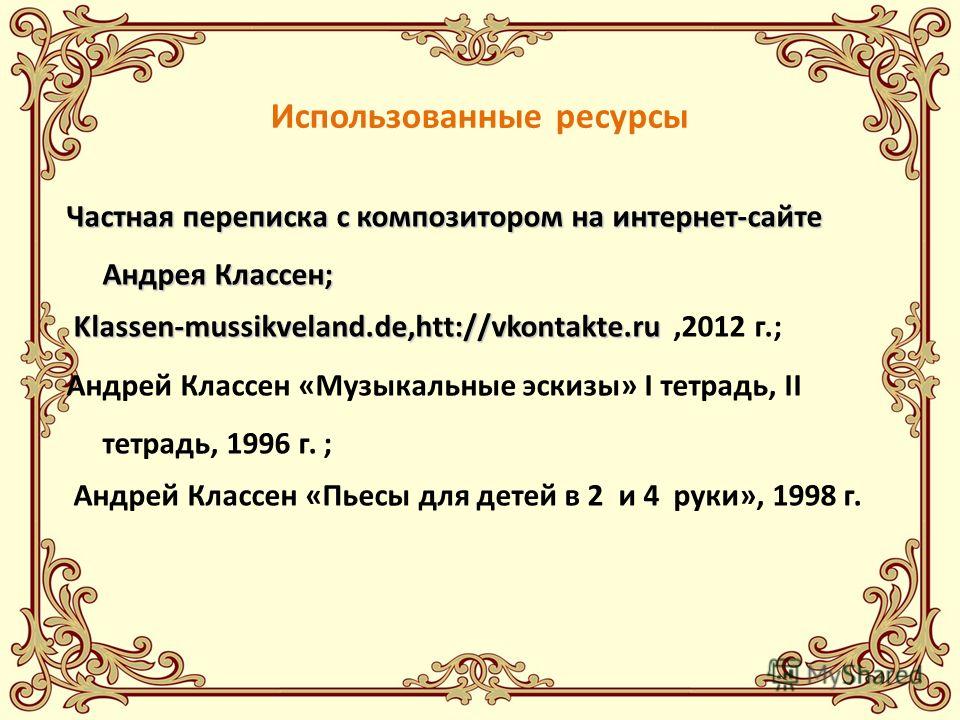
He is considered the founder of the St. Petersburg cello school. He also introduced new classes for the conservatory: orchestral playing, quartet and opera class. Already in the first year of the founding of the new educational institution, he was appointed not only a professor of the cello class, but also a professor of music history, which, obviously, was associated with his university education, which he received in Moscow at the Faculty of Mathematics and Physics. Very wide general education qualified him admirably for this job.
In the first year the Conservatory accepted 179 students, after which there were over 200 musicians annually. It would not be an exaggeration to say that the names of the first graduates of the St. Petersburg Conservatory have gone down in the history of world culture along with their outstanding professors.
Accepting applications in nominations
“Composition - in person”,
"Academic Vocals"
"Ensembles"
extended until September 10.
In the nomination "Composition - in absentia" acceptance of applications is closed
II International Competition contemporary music
"COMPOSERXXI CENTURY"
His name was the first carved on the marble plaque on the threshold small hall. Beklemische, which represents the seated composer with open account in hand. It is known that Tchaikovsky visited the St. Petersburg Conservatory only for the period of his apprenticeship, because the intensive period of creation, starting with the first symphony, was associated with a move to Moscow and an appointment at the Moscow Conservatory as one of the first professors. The first generation of musicologists approached Saremba, who taught composition theory.
He was also Tchaikovsky's first teacher, and his relationship with him was largely important for fate famous composer. According to documents kept at the Conservatory Museum, he was a respected and respected man whose 50th birthday was celebrated at the Conservatory with a luxurious photo album signed by his colleagues. Later he was elected an honorary member of the Russian Musical Society. Rimsky-Korsakov was appointed professor of instrumental and practical composition. He had no special professional university education, so the young lecturer learned a lot about self-study, which he needed to teach, and was not only good teacher, but also very good student in this regard.
ORGANIZERS:
Ministry of Culture and Tourism Kaluga region
- International Academy of Musical Innovation (Moscow)
MISSION OF THE COMPETITION:
Preservation and development of modern academic music
OBJECTIVES OF THE COMPETITION:
Identification and support of composers and performers of contemporary music;
- acquaintance with the work of contemporary composers;
- acquaintance with modern performers and various musical trends;
- strengthening the status of the listener as an indirect participant in the musical event;
- involvement of the listening audience Russian Federation and CIS countries to modern musical directions;
- expansion of the performers’ repertoire,
- creative motivation young performers to the study of contemporary music;
- holding "round tables" with contemporary composers and famous figures musical culture, teachers, performers, music analysts - in order to create a public resonance for the event and attract the attention of young people and the older generation to modern performing arts;
- creation of a catalog of modern composers and performers, with the possibility of their popularization in specialized media, among musical educational institutions Russia and CIS countries;
- raising the professional level of a modern musician-performer.
There is no doubt that Rimsky-Korsakov's vocation began new era professional compositional and theoretical education. The young professor taught at the department of composition theory and instrumentation and was the director of the orchestra class. He had an extraordinary influence on all areas of the conservatory. Among other things, he sought a reorganization of harmony courses. The result of these efforts was his first training program and the first textbook on harmony, which later saw several new editions. Brunot commented: “It is difficult to imagine a concept that is simpler, more understandable and more natural; And I would like this method of teaching to be accepted everywhere.”
PARTICIPANTS:
- Composers who presented their own academic works for vocalists or ensembles ( up to 5 performers inclusive) in person ( live performance) or in absentia (audio or video recording).
- Performers with a diploma special education, students of creative universities and colleges in Russia and around the world. Participation is possible instrumental ensembles in any composition, as well as in mixed composition vocalists and instrumentalists ( no more than 5 people). Note: vocal ensembles do not participate in the competition. The composition of the ensemble must remain unchanged throughout the competition.
NOMINATIONS and AGE RESTRICTIONS:
Rimsky-Korsakov said that every talented artist must unite two people at the same time: he must be a technician as well as an artist. Just as it is impossible to create moods with technology alone, it is impossible to create entire works with only poetic sensibility. In this context great teacher insisted on the indispensable individualistic method of training talented students.
He developed a detailed system vocational education composers, which was improved over the years and became the Rimsky-Korsakov class. This class has become one of the best and most competent in the conservatory. For almost 40 years this class has graduated from many students of various disciplines. Perhaps that is why the brilliant crowd of his students was amazed, and immediately after finishing his class he was considered a new professor at the conservatory. All these outstanding musicians taught at the conservatory for about 40 or more years.
- « Academic vocals»: from 18 to 35 years inclusive
- "Ensembles"(duet, trio, quartet, quintet): from 17 years old - without restriction
- "Composition": from 17 - no restrictions
PROCEDURE AND PROGRAM REQUIREMENTS:
- "Academic Vocals":

- "Ensembles":
- I round- performed (fragment or whole) from one to three works by composers of any country, written after 2000 at the choice of the participants. The total playing time is up to 20 minutes.
- IItour- performed (fragment or whole) one, not performed in the 1st round, a work by a composer of any country written after 2000 Playing duration - up to 12 minutes.
——————————————————————————————————————————
Many of Rimsky-Korsakov's students produced warm and enthusiastic memories. Just like they were in their own work, his students greeted him in recognition of their teacher. Lyadov, an excellent master of the best miniatures of pianists and orchestral fairy tales, who appreciate "every note" of their teacher with passion. Prokofiev, who was in the class last year famous life masters
On this moment he criticized foreign music mostly very harshly. However, for the opera “The Legend of the Invisible Town of Kitesh” he behaved with great enthusiasm at the premiere, according to him in my own words, he clapped so hard until his arms hurt to name the composer on stage. Stravinsky, who was a private student of Rimsky-Korsakov, identified with the great musician not only as a teacher or teacher, but even as a father. Rimsky-Korsakov's sons - Andrei and Vladimir - were friends of Stravinsky's youth.
- "Composition": full-time or correspondence participation
- In-person participation involves a live performance of a competition piece written after 2000. The composer independently organizes their preparation and performance. The work is evaluated in the “Composition” nomination. The jury will evaluate the performance only if the musicians have submitted their applications in a timely manner as participants in the performing categories of the competition.
- Correspondence participation involves the work of the jury with sheet music and recordings (audio or video). Works for academic vocals and works for ensemble written no earlier than 2000 are auditioned. Each composer can present up to three works. Note: Midi format is not accepted for listening.
- Each composer enters into an Author's Agreement for permission to perform and use these works within the framework of International competition contemporary music "COMPOSER OF THE XXI CENTURY". A sample agreement can be downloaded from the website.
 Note:
Note:
After Rimsky-Korsakov's death, Stravinsky wrote a funeral song for wind instruments in memory of his teacher. The author later said about this indicator that it was one of the best in early period and very progressive in his use of chromatic harmony. The composer himself had a decisive influence on all who studied with Rimsky-Korsakov, or at least accepted his advice.
Glazunov. Eminent Russian composer and staunch supporter classical traditions was associated with the Conservatory in endless devotion, ensuring its rise in the most difficult historical conditions. It is difficult to assess the importance of Glazunov, who remained as director for almost three decades and who, together with the Conservatory, lived through a new cultural and historical era. Steinberg, an important guardian of the school's traditions. Rimsky-Korsakov.
1) vocalists perform the program by heart;
2) ensemble music can be performed according to notes;
3) in I andIIIn rounds, the work presented at the qualifying audition is allowed to be performed.
——————————————————————————————————————————
DATES:
Until September 01, 2014- preliminary registration of participants. Participants provide a complete package: Recordings, Musical Materials, Documents and Application for Participation. The application can be downloaded on the competition website. To prepare an official invitation to obtain a Russian visa, the Organizing Committee of the competition asks participants from the European Union, USA, Asia and Africa to provide documents by August 1, 2014.
Shostakovich, who became a symbol new music. Rimsky-Korsakov and his school have remained a legacy of professionalism for subsequent generations of composers and theorists to this day. The memory of the great Russian composer is respectfully preserved throughout the world. The anniversary was celebrated at the Royal festival hall in London, in our days called "The Discovery of Rimsky-Korsakov." Today, the St. Petersburg Conservatory has seven faculties: composition, piano, orchestra, vocal direction, conducting, musicology and folk instruments.
Until September 15, 2014 - qualifying audition in the “Academic Vocal” nomination. The results will be published on the website and sent to participants by email.
17 October 2014- press conference, opening of the competition, in-person registration of participants and guests, drawing lots in groups (groups are formed by the organizing committee before the start of the competition), competitive audition of vocalists, announcement of finalists in the “Academic Vocal” nomination.
Among the professors and students of the conservatory there are famous names in all disciplines: composers, conductors, opera directors, choreographers, orchestral musicians, pianists, singers and musicologists. The Board of Trustees was renewed. An association of graduates of the Conservatory was created. On the one hand, international symposia and master classes are held within the walls of the St. Petersburg Conservatory, on the other hand, in different countries with the participation of St. Petersburg professors, doctoral students and students.
For many years, creative ties have been maintained with major universities and music schools such as Hamburg, Dresden, Cologne, Wrozlaw, Rotterdam, Boston, Birmingham and others. Olesya Yantsko, translated by Ekaterina For sale. He transcends the boundaries between two genres, which he considers redundant. Frank Strobel has been an innovator in the interdisciplinary field of film and music for many years, and is one of the film's protagonists in the concert movement. Thanks to his involvement, the silent film found its way into leading opera and concert halls.
October 18 2014- in-person registration of participants and guests, drawing lots in groups (groups are formed by the organizing committee before the start of the competition), competitive audition of ensembles, announcement of finalists in the “Ensembles” nomination. Master class for vocalists.
October 19 2014- II round of the competition in the nominations “Academic Vocals”, “Ensembles”, round table, ceremonial closing of the competition.
THE TERMS OF PARTICIPATION:
- To participate you must until September 1, 2014 send a package of documents to the address [email protected]
- For remote listening, it is necessary to provide the organizing committee with recordings of any one or two works performed by the competitor.
A competitor can participate in several nominations.
- Vocalists perform with their accompanist. If necessary, upon the preliminary application of the participant, the Organizing Committee can provide its accompanist free of charge. The accompanist can also act as a member of the ensemble (guitar, harp, piano).
- The organizing committee reserves the right to broadcast concerts and auditions of the competition on radio and television. Coverage of the competition is carried out on the portal of a single information system“Music and culture” www.muzkult.ru.
- If a participant fails to show up for registration, the entry fee is not refunded.
- Each participant can register in the "Music and Culture" system (muzkult.ru) and become an active participant in the internal Forum of the competition. This will allow you to send messages from your personal account in the system to both the participants of the competition and members of the organizing committee, to be aware of all the news and events related to the competition. To join the forum, after registering in the "Music and Culture" system, you must write an email to the competition's e-mail indicating your full name. And Email. IN personal account in the “Subscriptions” section the “Competition” group will become available Composer XXI century."
- The Organizing Committee provides hotel reservations upon prior requests from participants, and issuance of invitations for obtaining a visa. Transportation, medical insurance, meals and all other necessary expenses are covered by the participant of the competition.
- By obligatory agreement with the Organizing Committee, the participant of the competition can independently organize an amateur recording of his competition.
To register: go to the website www.muzkult.ru and on the left side click the “Registration” button. After the registration procedure in your personal account, click muzkult.ru (beginning) and select "Moscow". Find "Composer of the 21st Century" in the list of sites and click the "Join" button.
You can download the application form, the contract form with the author, and details for paying the registration fee on the competition website at the link:
REQUIRED DOCUMENTS FOR PARTICIPANT REGISTRATION:
- Application for participation (with a full indication of the program being performed in rounds, the order of execution, indicating the title, as well as the first and last names of the authors).
- Resume (in free form - strictly up to 800 characters);
- Information about participation in other performing competitions and titles received - if available;
- Photo;
- Photocopy or scan of the paid receipt (only for participants of the 1st round);
- A photocopy or scan of the Passport or ID (for Russian citizens - including the page of the passport of a citizen of the Russian Federation with registration at the place of residence);
- Sheet music (for composers only);
- Audio or video recording (only for non-award-winning vocalists and correspondence composers).
- In the “Ensemble” nomination, one application must be submitted indicating all participants, contact information and instruments. The photo can be either general for the entire ensemble, or in the form of separate photos for the participants. The summary is given for the entire ensemble or with a brief creative biography (volume by number of characters - 300) each performer (examples of resumes can be found on the competition website or in the booklet).
 An application for participation sent without a complete set of specified documents will not be accepted.
An application for participation sent without a complete set of specified documents will not be accepted.
WINNERS ARE AWARDED
diplomas of 1st, 2nd, 3rd degree laureates, competition winners, cash prizes and valuable prizes.
"Academic Vocals"
1st prize - 35,000 rubles.
2nd prize - 25,000 rubles.
3rd prize - 15,000 rubles.
"Ensembles"
1st prize - 40,000 rubles.
2nd prize - 30,000 rubles.
3rd prize - 20,000 rubles.
"Composition" (in absentia)
1st prize - 35,000 rubles.
2nd prize - 25,000 rubles.
3rd prize - 15,000 rubles.
"Composition" (in person)
1st prize - 35,000 rubles.
2nd prize - 25,000 rubles.
3rd prize - 15,000 rubles.







